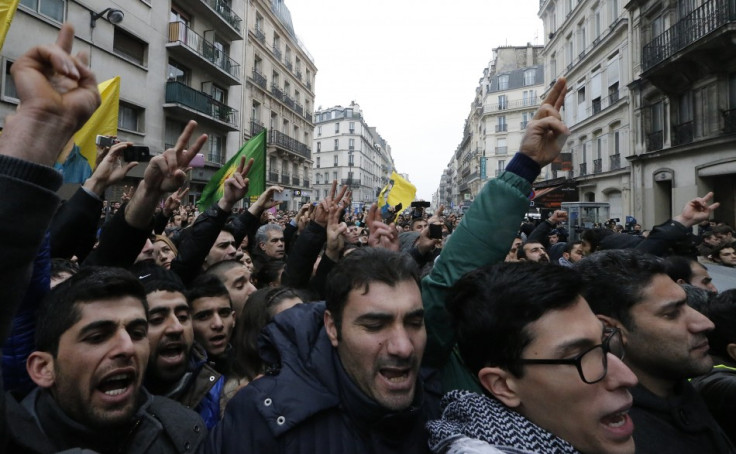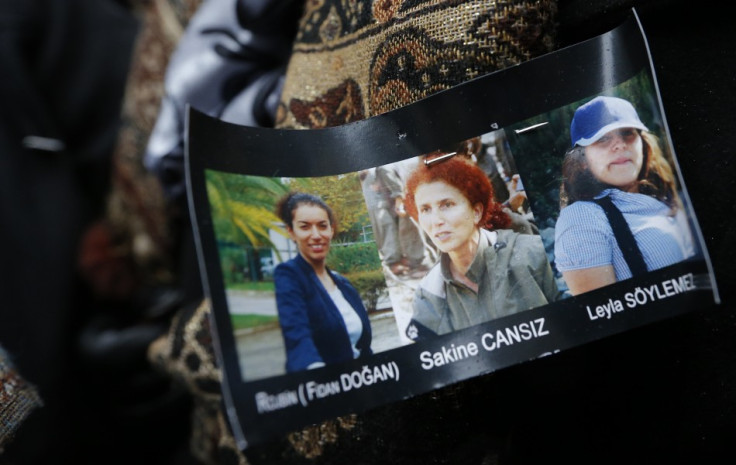Kurdish Activists Blame Turkey for Paris Murder of PKK Co-Founder Sakine Cansiz

Representatives of Turkey and Kurdistan have exchanged blame for the killing of three female activists at a Kurdish information centre in Paris, but both sides agree the "execution" was an attempt to derail ongoing peace talks.
French police found the bodies of Sakine Cansiz, a co-founder of the Kurdish militant separatist group PKK, Fidan Dogan, a representative of the Brussels-based Kurdistan National Congress (KNK) and young activist Leyla Soylemez at the information centre on Rue Lafayette, in the centre of Paris.
The three had reportedly been shot in the head, a circumstance that led French interior minister Manuel Valls to say the deaths were "without doubt an execution".
"This could have only be done by the Turkish government," KNK UK representative Akif Wan told IBTimes UK. "I don't have any evidence to say this, but I would be really surprised if it wasn't the case.
"It was an attack against a peaceful resolution of the Kurdish question."
The slayings came just a day after it was reported that Turkish officials and jailed PKK leader Abdullah Ocalan had agreed on a road map to end the three decade-long conflict between Turkey and the PKK, which has cost the lives of about 40,000 people thus far.
The deal reportedly included the PKK's disarmament and the abandonment of its project to create an independent homeland inside Turkey, in exchange for wider rights for the Kurdish minority.
Wan, 53, said he had been friends with one of the victims, Dogan, since 2000, and had last seen her two weeks ago at a KNK convention in Brussels.
"I cannot describe the shock I had when I heard the news," Wan said, adding that the woman didn't look frightened or give any element to suggest something bad was about to happen.
Wan, who came to Britain as a political refugee in 1992, also blamed French authorities for failing to protect the Kurdish "diplomats".
"It is scary that people doing diplomatic work can be assassinated like that in central Paris, in the middle of Europe. Turkey shouldn't be allowed to do such things." Wan said.
Armel Taverdin, a lawyer for one of the three victims, told France 24 that two of the three victims were under surveillance by French police.
Kurdish activists have often blamed Turkish government forces for the extra-judicial killings of militant separatists in Turkey, but the Paris executions marked the first-ever killing of a senior PKK member on European soil.
Hundreds of Kurds chanting anti-Turkish slogans gathered in front of the Information Centre where the women were killed. Wan said a protest rally will be held in front of the Turkish embassy in London tomorrow.
However, a Turkish lawmaker believes the PKK's history of internal executions provides the clue to the murderer's identity.
Huseyin Celik, the deputy chairman of the ruling Justice and Development Party, said the attack is the result of "an internal feud" within the PKK designed to derail peace talks.
Turkish government spokesman Bulent Arinc condemned the attack and expressed his condolences to the victim's relatives. "This is utterly wrong," he told reporters.
The PKK is recognised as a terrorist organisation by the EU and the US.
Nevertheless Turkey has frequently accused several EU countries, including France, of giving shelter to PKK "terrorists", refusing their extradition.

© Copyright IBTimes 2025. All rights reserved.






















